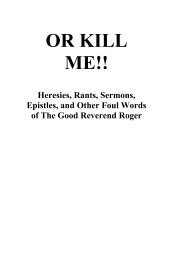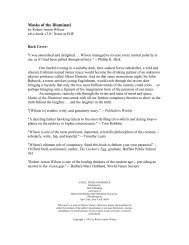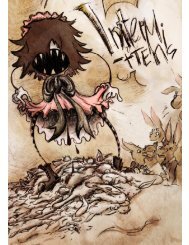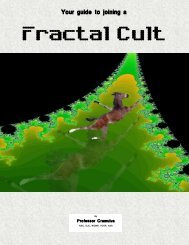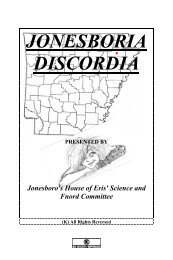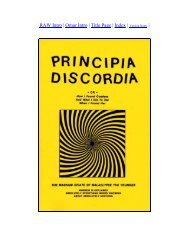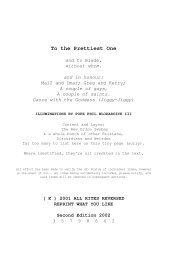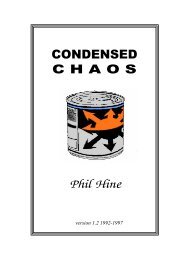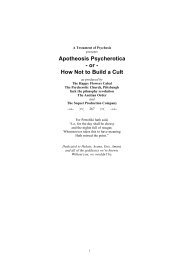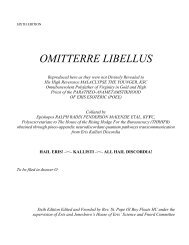Coincidance - Principia Discordia
Coincidance - Principia Discordia
Coincidance - Principia Discordia
Create successful ePaper yourself
Turn your PDF publications into a flip-book with our unique Google optimized e-Paper software.
COINCIDANCE 89<br />
Is bowed with woe—for he is gone<br />
Who would have wrought her destiny<br />
They had their way: they laid him low.<br />
But Erin, list, his spirit may<br />
Rise, like the Phoenix, from the flames,<br />
When breaks the dawning of the day<br />
Oscar Wilde, another Irishman, said it would take a heart of stone to read<br />
the death of Little Nell (in Dickens) without laughing. In 'Ivy Day in the<br />
Committee Room," Joyce drenches the sentimentality of Joe Hynes in<br />
mockery, producing exactly and precisely the bad poem Joe himself would<br />
write if asked to collaborate on the story, and then proceeds to cap the<br />
absurdity with Crof ton's doubly-ambivalent hypocrisy; but who can sneer<br />
as the ghost of Parnell indubitably rises, even clothed in journalistic "verse,"<br />
to haunt and afflict those who betrayed him? The dead and absent is<br />
stronger than the live and present, and Joyce has vindicated his paradox.<br />
That Joe Hynes is a man of "timid courage"—he has to be prompted<br />
several times before he will consent to read his subversive poem—indicates<br />
that another paradox from the 1902 lecture was still on Joyce's mind. Joe's<br />
hesitation is not only motivated by the fact that he is the only loyal Parnellite<br />
in the room, but is also necessary because he included a line (not quoted<br />
above) about the "rabble-rout of fawning priests" that will not go down<br />
smoothly with any Irish Catholic audience.<br />
In "The Dead," the last story in Dubliners, Joyce returns to and enriches the<br />
themes of death, absence and timid courage. Gabriel Conroy, the protagonist,<br />
is an intellectual who is nervous, or timid, all through the story, because he<br />
knows that his opinions are not shared by his middle-class relatives. Nonetheless,<br />
he does state his opinions, even though hesitantly; and he has the<br />
courage to commit the "social sin" of marrying a woman from Connacht,<br />
even though Dubliners regard Connacht people as declasse. Courageous in<br />
his timidity, Gabriel is timid in his courage, and when asked directly if Gretta<br />
is from the West, he answers evasively that "her people" were.<br />
The real hero of "The Dead," we only learn at the end, is not Gabriel but<br />
Michael (the angelic names are no coincidence, anymore than the Phoenix in<br />
the "Ivy Day" poem was an accident). Michael Furey, specifically, loved<br />
Gretta before Gabriel did, and Michael even died for love—in a Romantic,<br />
absurd, Irish way, of course. Michael Furey died of pneumonia, which he<br />
caught standing all night in an Irish rainstorm singing love songs beneath<br />
Gretta's window. It is he, not Gabriel, who has dominated Gretta's thoughts<br />
and feelings all through the story: dead and absent, he is very alive and<br />
present in her heart. The dead, Joyce is here proposing, cannot only<br />
psychologically displace us but even metaphorically cuckold us.



